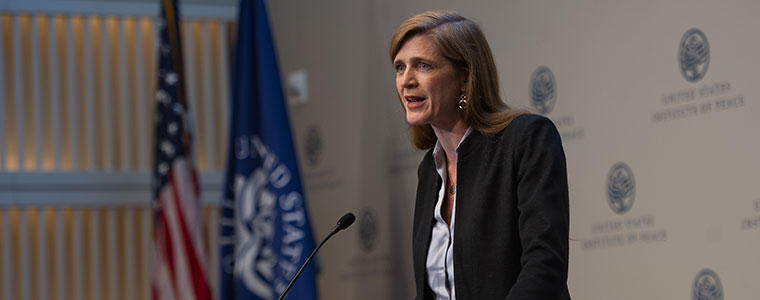The Global Refugee Crisis: Overcoming Fears and Spurring Action
Read the Event CoverageOn Wednesday June 29, Ambassador Samantha Power, U.S. Permanent Representative to the United Nations and a member of President Obama’s Cabinet, addressed an audience at the U.S. Institute of Peace on the urgent need for a concerted, global response to the current refugee crisis. She also previewed the Leaders’ Summit on Refugees that President Obama will convene at the U.N. on September 20.

Ambassador Samantha Power
At the United Nations, Power works to advance U.S. interests, promote and defend human rights, and address pressing challenges to global peace and security. Prior to serving as U.S. Permanent Representative to the United Nations, Ambassador Power served as Special Assistant to the President and Senior Director for Multilateral Affairs and Human Rights on the National Security Staff at the White House. Before joining the U.S. government, Ambassador Power was the Anna Lindh Professor of the Practice of Global Leadership and Public Policy at Harvard University’s John F. Kennedy School of Government, teaching courses on U.S. foreign policy, human rights, and UN reform. She was also the founding executive director of the Carr Center for Human Rights Policy.
The Honorable Nancy Lindborg
At the U.S. Institute of Peace, Nancy Lindborg supports and promotes practical solutions for preventing and resolving violent conflict around the world. Lindborg has spent most of her career working in fragile and conflict affected regions around the world. Prior to joining USIP, she served as the Assistant Administrator for the Bureau for Democracy, Conflict and Humanitarian Assistance (DCHA) at USAID. From 2010 through early 2015, Ms. Lindborg led USAID teams focused on building resilience and democracy, managing and mitigating conflict and providing urgent humanitarian assistance. Prior to joining USAID, Ms. Lindborg was President of Mercy Corps, where she spent 14 years helping to grow the organization into a globally respected organization known for innovative programs in the most challenging environments.



